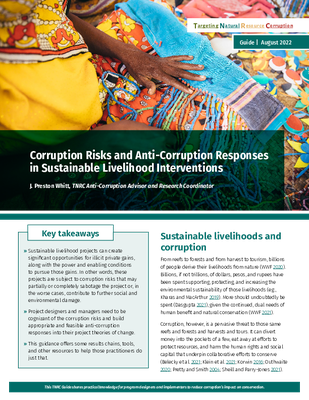Corruption Risks and Anti-Corruption Responses in Sustainable Livelihood Interventions
Sustainable livelihood projects can be vulnerable to corruption risks that may contribute to further social and environmental damage. This guide has been developed for programming designers and implementers aiming to reduce corruption's impact on community-based conservation initiatives. It contains three modules exploring the corruption opportunities, power, and justifications that might manifest in three typical sustainable livelihood interventions. Each module identifies corruption risks in that activity type and anti-corruption responses that have been tried or can be considered to address those risks.
https://biodiversitylinks.org/projects/current-global-projects/tnrc/resources/corruption-risks-sustainable-livelihoods-guide.pdf/view
https://biodiversitylinks.org/projects/current-global-projects/tnrc/resources/corruption-risks-sustainable-livelihoods-guide.pdf/@@download/image/image.png
File
Corruption Risks and Anti-Corruption Responses in Sustainable Livelihood Interventions
Sustainable livelihood projects can be vulnerable to corruption risks that may contribute to further social and environmental damage. This guide has been developed for programming designers and implementers aiming to reduce corruption's impact on community-based conservation initiatives. It contains three modules exploring the corruption opportunities, power, and justifications that might manifest in three typical sustainable livelihood interventions. Each module identifies corruption risks in that activity type and anti-corruption responses that have been tried or can be considered to address those risks.



